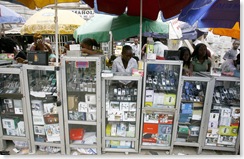Vodafone’s controversial purchase of a 70 per cent stake in Ghana Telecom (GT) for US$900 million was ratified by Ghana’s parliament on August 14. However, an informed source told Comm. the bundling of the country’s fibre backbone company into the deal has been the core reason for the widespread criticism of the privatisation.
A Vodafone statement said the number of mobile subscribers in Ghana are growing at more than 55 per cent a year, with mobile penetration currently standing at around 35 per cent.
The source described how the national fibre optic company was previously under the administration of the national power utility, the Volta River Authority, and was transformed into a separate independent entity to further extend its backbone across all the main regions of Ghana and ensure equal access to all operators.
“This was a central part of the country’s ICT policy towards ensuring broadband access to all the regional capitals,” commented the source. “The government then turned around and bundled it up with GT and looked to sell it off to one operator. Perhaps the government has ensured Vodafone will not abuse this position through some contractual clauses, but if that’s the case, they’ve failed in informing the public of such an agreement.”
The Ghanaian government will retain a 30 per cent stake in the GT, which also operates the country’s third largest mobile operator, while details of the fibre optic backbone network have not been specified.
GT’s privatisation process has attracted extensive condemnation from opposition parties in parliament since negotiations with Vodafone began in July, with opposition parliamentarians suggesting the deal grossly undervalued GT at US$1.3 billion.
“There were quite a number of highly placed individuals who were fronting other parties and investors wanting to acquire the asset. Having lost out, this (opposition to the deal) was their response,” surmised the informed source. “The opposition in parliament is definitely being fed information from these interested sources.”
At a special assembly called during summer recess to debate the deal, the 230 seat National Assembly approved the sale of GT to Vodafone with 124 votes in support versus 74 against, as not all members of parliament were present for the special session.
The parliamentary building had earlier been the scene of protesters and opposition members, while GT staff held their own demonstrations and submitted a petition urging the government to finalise the contract and save the incumbent from collapse.
Employees stated that the indebted operator needed a company with the financial muscle of Vodafone to survive the local competition, dominated by multinational players investing large sums in network rollout and the improvement of quality of service.





0 comments ↓
There are no comments yet...Kick things off by filling out the form below.
Leave a Comment